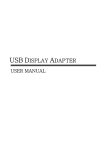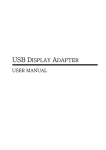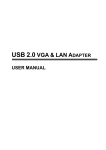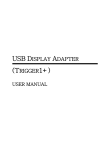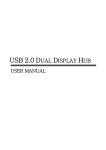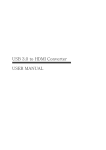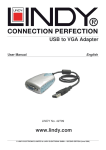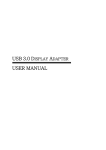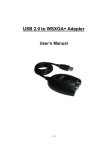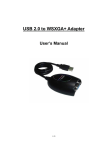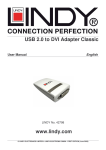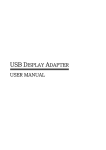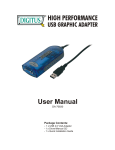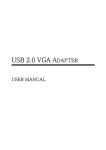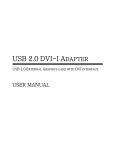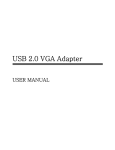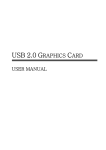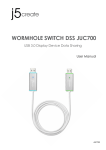Download User Manual
Transcript
HIGH PERFORMANCE USB 2.0 GRAPHIC ADAPTER User Manual (DA-70831 / DA-70832) CONTENTS INTRODUCTION........................................................................................ 3 FEATURES .......................................................................................... 3 SYSTEM REQUIREMENTS................................................................... 3 PACKAGE CONTENTS ........................................................................ 3 SUPPORTED COMMON DISPLAY RESOLUTION: ................................ 4 TECHNICAL SPECIFICATIONS: .......................................................... 4 INSTALLATION ON WINDOWS 2000 / XP ................................................ 5 DEVICE DRIVER INSTALLATION ....................................................... 5 VERIFYING DEVICE DRIVER INSTALLATION .................................... 7 DEVICE DRIVER UN-INSTALLATION ................................................. 9 INSTALLATION ON WINDOWS VISTA.................................................... 10 DEVICE DRIVER INSTALLATION ..................................................... 10 VERIFYING DEVICE DRIVER INSTALLATION .................................. 13 DEVICE DRIVER UN-INSTALLATION ............................................... 15 FUNCTION DESCRIPTION ...................................................................... 16 ACCESS USB DISPLAY ADAPTER UTILITY .................................... 16 DISPLAY ID – Smart Display Device ID Detection .................... 16 DISPLAY RESOLUTION – Fast Access to Display Resolution Setting......................................................................................... 16 DISPLAY ROTATION ................................................................... 17 DISPLAY MODES ........................................................................ 17 IDENTIFY MONITORS ................................................................ 18 MULTI-DISPLAY CONTROL PANEL ........................................... 19 DISPLAY SETTINGS .................................................................... 19 Q&A....................................................................................................... 20 TROUBLESHOOTING TIPS .................................................................... 21 Known Issues ................................................................................... 21 General Recommendation ................................................................ 21 Media Playback ................................................................................ 21 Others ............................................................................................... 22 REGULATORY COMPLIANCE ................................................................. 23 USER MANUAL INTRODUCTION Thank you for purchased the USB 2.0 GRAPHIC ADAPTER. The USB 2.0 GRAPHIC ADAPTER enables you to connect one display devices (CRT/LCD monitor, projector) to your desktop or notebook PC. The connected display can act as mirrored or extended desktop of the main display on your PC. The flexibility of the common USB 2.0 technology saves the need to open the computer or struggling with compatibility issues related to the VGA card. FEATURES USB 2.0 compliant Support display resolution up to VGA : 1600 x 1200 / DVI : 1680 x1050 Plug-and-Play USB connectivity Support Function Display Modes: Primary, Extended, Mirror Display Rotation: 0°, 90°, 180°, 270° Friendly software targeted to ease your daily USB Display experience Identify Monitors Multi-Display Control Panel Shortcut to access Windows Display Setting dialog SYSTEM REQUIREMENTS Available USB 2.0 port Minimum Requirement to use one (1) USB Display Adapter: CPU: Intel/AMD Single Core 1.5GHz or higher processor RAM: 512MB memory or higher 2~3 Displays: (additional USB display adapters) CPU: Intel/AMD Single Core 2.4GHz or higher processor RAM: 1GB memory or higher 4~6 Displays: (additional USB display adapters) CPU: Intel/AMD Dual Core 2.0GHz or higher processor RAM: 2GB memory or higher Windows 2000 SP4, Windows XP SP2 or SP3 and Vista SP1 (32-bit or 64-bit) PACKAGE CONTENTS USB 2.0 GRAPHIC ADAPTER CD (User Manual, Driver and Utility) Quick Installation Guide 3 USER MANUAL SUPPORTED COMMON DISPLAY RESOLUTION: Resolution USB-VGA USB-DVI Refresh Rate Frequency 800 * 600 16bit, 32bit 16bit, 32bit 60Hz,75Hz 1024 *768 16bit, 32bit 16bit, 32bit 60Hz,75Hz 1152 * 864 16bit, 32bit 16bit, 32bit 60Hz 1280 * 720 16bit, 32bit 16bit, 32bit 60Hz 1280 * 768 16bit, 32bit 16bit, 32bit 60Hz 1280 * 800 16bit, 32bit 16bit, 32bit 60Hz 1280* 960 16bit, 32bit 16bit, 32bit 60Hz 1280 * 1024 16bit, 32bit 16bit, 32bit 60Hz 1360 * 768 16bit, 32bit 16bit, 32bit 60Hz 1400 * 1050 16bit, 32bit 16bit, 32bit 60Hz 1440 * 900 16bit, 32bit 16bit, 32bit 60Hz 1680 * 1050 16bit, 32bit 16bit, 32bit 60Hz 1600 * 1200 16bit, 32bit 60Hz TECHNICAL SPECIFICATIONS: Operating System Windows 2000/XP/Vista Compatible Video Output Connector D-Sub 15pin ( female) – Model: USB-VGA DVI-I – Model: USB-DVI Case Material ABS Power Source Bus Powered 4 USER MANUAL INSTALLATION ON WINDOWS 2000 / XP DEVICE DRIVER INSTALLATION Installing the device driver enables your computer’s operating system to recognize the USB DISPLAY ADAPTER once it’s connected. Please check your operating system and refer to the appropriate installation procedure to begin installing the device driver. This section illustrates the simple device driver installation procedure for computer running Windows 2000 / XP operating system. Please make sure the USB DISPLAY ADAPTER is unplugged from your PC or Notebook before executing the setup program. Step 1. Insert the Driver CD into the CD-ROM drive; the setup program should be launched automatically. If setup program does not begin automatically, click Start, Run and double click “D:\Setup.exe” (where D: is the path of your CD-ROM drive). Step 2. Driver Installation Wizard, click “Next” to continue. Step 3. License Agreement; please read it and select “I accept the terms of the license agreement.” Click “Next” to accept the License Agreement. 5 USER MANUAL Step 4. Setup is searching for installed features….. *You may notice the screen flashes during hardware installation. It is part of the normal process. Step 5. Please select “Yes, I want to restart my computer now” and click “Finish” to complete the software installation. Step 6. (After System Reboot) Please connect the external display device (monitor/projector) to the VGA/DVI connector of USB DISPLAY ADAPTER and switch it on. Then plug the USB DISPLAY ADAPTER into an available USB 2.0 port of your PC on the lower right toolbar, and the or Notebook. You will see an icon extended display will be shown on the attached display device. The USB DISPLAY ADAPTER is ready to use now. Step 7. INSTALLATION OF MULTIPLE USB DISPLAY ADAPTERS Please plug the additional USB DISPLAY ADAPTERS into the available USB 2.0 port of your PC or Notebook. The hardware driver setup will begin automatically. To make sure the USB Display Adapter worked correctly, please reboot the computer after finished the installation. After reboot the computer, the USB extended display will be shown on the display device. 6 USER MANUAL VERIFYING DEVICE DRIVER INSTALLATION The following procedure allows you to verify the device driver installation. Please right click “My Computer” → “Properties” → “Hardware” → “Device Manager”. Plug-in the USB DISPLAY ADAPTER, then double click “Display adapters”, and “Universal Serial Bus controllers”. It will show the new directions as below, Single USB Display Adapter installation on the computer 7 USER MANUAL Multiple USB Display Adapter installation on the computer 8 USER MANUAL DEVICE DRIVER UN-INSTALLATION Step 1. Start menu: Click “Start” → “ “Control Panel” → “Add or Remove Programs” Select “ USB Display Device (Trigger 1+) 9.xx.xxxx.0159” (driver ver.). Click “Remove” button. Step 2. Unplug the USB DISPLAY ADAPTER and click “OK” to continue. Step 3. Select “Yes, I want to restart my computer now” and click “Finish” to reboot. After reboot, you will complete the driver un-installation. 9 USER MANUAL INSTALLATION ON WINDOWS VISTA DEVICE DRIVER INSTALLATION Installing the device driver enables your computer’s operating system to recognize the USB DISPLAY ADAPTER once it’s connected. Please check your operating system and refer to the appropriate installation procedure to begin installing the device driver. This section illustrates the simple device driver installation procedure for computer running Windows Vista operating system. Please make sure the USB DISPLAY ADAPTER is unplugged from your PC or Notebook before executing the setup program. Step 1. Insert the Driver CD into the CD-ROM drive; the setup program should be launched automatically. If setup program does not begin automatically, click Start, Run and double click “D:\Setup.exe” (where D: is the path of your CD-ROM drive). Step 2. Driver Installation Wizard, click “Next” to continue. Step 3. License Agreement; please review it and check “I accept the terms of the license agreement.” Click “Next” to accept the License Agreement. 10 USER MANUAL Step 4. Setup is searching for installed features... *You may notice the screen flashes during hardware installation. It is part of the normal process. Step 5. Please select “Yes, I want to restart my computer now”. Then, click “Finish” to complete the software installation. Step 6. (After system reboot) Please connect the external display device (monitor/projector) to the VGA/DVI connector of USB DISPLAY ADAPTER and switch it on. Then plug the USB DISPLAY ADAPTER into an available USB 2.0 port of your PC or Notebook. The hardware driver setup will begin automatically. After the driver is configured, you may begin to use the USB Display Adapter with your display device. Step 7. INSTALLATION OF MULTIPLE USB DISPLAY ADAPTERS Please plug the additional USB DISPLAY ADAPTER into another available USB 2.0 port of your PC or Notebook. The setup process will begin automatically. balloons for each additional 11 You may see below notification USER MANUAL To make sure the USB Display Adapter worked correctly, please reboot the computer after finished the installation. After reboot the computer, you will see an icon on the lower right toolbar, and the extended display will be shown on the attached display device. The USB DISPLAY ADAPTER is ready to use now. 12 USER MANUAL VERIFYING DEVICE DRIVER INSTALLATION The following procedure allows you to verify the device driver installation. Please right click “Computer” → “Properties” → “Device Manager”. Plug-in the USB DISPLAY ADAPTER, then double click “Display adapters”, and “Universal Serial Bus controllers”. It will show the new directions as below, Single USB Display Adapter installation on the computer 13 USER MANUAL Multiple USB Display Adapter installation on the computer 14 USER MANUAL DEVICE DRIVER UN-INSTALLATION Step 1. Access Program Uninstall: Click “Start” →“Control Panel”. Under “Programs and Features” click “Uninstall or change a program” Look for “ USB Display Device (Trigger 1+) 9.xx.xxxx.0159” (driver ver.) Click “Uninstall” button. Step 2. Unplug the USB DISPLAY ADAPTER and click “OK” to continue. Step 3 Select “Yes, I want to restart my computer now” and click “Finish” to reboot. After reboot, you will complete the driver un-installation. 15 USER MANUAL FUNCTION DESCRIPTION This section describes several friendly functions provided by the USB-DISPLAY ADAPTER designed to ease your single or multiple USB display experience. A display device described in this section means devices such as CRT, LCD monitor, TV display, projector. ACCESS USB DISPLAY ADAPTER UTILITY Make sure the USB Display Adapter is attached to the PC. on your Windows Start bar. Look for this Right-click this icon to access the variety of functions associated to the adapter. The first view of the utility, you will notice below sections on the top menu. DISPLAY ID – Smart Display Device ID Detection USB Display Adapter supports VESA defined DDC/EDID. The utility could show the display device ID whenever it is attached to the USB Display Adapter. If there is no display device attached to the USB Display Adapter, an “Unknown Monitor” ID will be shown. In some cases, the attached display device does not support EDID, the ID will also defined as “Unknown Monitor”. DISPLAY RESOLUTION – Fast Access to Display Resolution Setting The default setting resolution is: 1024 * 768 * 32bit. 16 USER MANUAL DISPLAY ROTATION 4 options available: “0°, 90°, 180°, 270° under the Extended or Primary display modes. It is a useful function for some rotatable display device. DISPLAY MODES “EXTENDED” DISPLAY MODE (DEFAULT) A default display mode; this feature allows the attached USB Display enabled display device to work as “Extended” display of the on-board screen. The extended working space improves work efficiency. You may change the relative position of this extended USB Display enabled display device under the Display Settings. “MIRROR” DISPLAY MODE This feature allows the same contents of on-board screen to be displayed (mirroring) to the USB Display enabled display device. The screen resolution setting on the USB Display enabled device will follow the on-board screen’s resolution. For example, if the on-board screen’s resolution is 1024x768x32bit, and the USB Display enabled device will set as the same resolution. 17 USER MANUAL “PRIMARY” DISPLAY MODE A unique feature to allow USB Display enabled device to act as the main working display. The USB Display Adapter will work as the main graphics adapter of the system. The on-board screen will work as the extended display. Please be advised that some display utility and drivers that shipped with certain AGP and built-in display adapters may prevent this option from working on some systems. You may disable the other utility program (usually found in the same toolbar located on the bottom right hand corner) to make this function work properly. “OFF” DISPLAY MODE This option disables the video output from USB DISPLAY ADAPTER. IDENTIFY MONITORS Easy display identification via a serial number will be showed on the upper right corner of all attached display devices. 18 USER MANUAL MULTI-DISPLAY CONTROL PANEL An unique feature to allow much quicker and simpler working experience under multi-display environment. A series of hotkey to quickly move active window or cursor to the desired display device (either on-board or each USB Display enabled devices). The default setting of hotkeys can be found on the Hotkey List of “MultiDisplay Control Panel”. For example: Ctrl + 2 means: to move the window to the Display 2. DISPLAY SETTINGS Fast access to the system “Display Settings” . 19 USER MANUAL Q&A This section describes the common Q&A regarding to the installation or operation of the USB DISPLAY ADAPTER. Q: Why can’t I make the USB DISPLAY ADAPTER the primary display? A: Some video cards ship their product with a utility that prevent other video cards from being set as the primary card. Check the bottom right hand corner taskbar for the utility. Disable the utility before switching our adapter to be the primary display. Q: Why won’t my DVD player work when I move it over to the extended display? A: Some DVD playback software packages do not support playing on a second display adapter of any kind. You may try to open the program in the secondary display first before playing the DVD. Q: How come my video will not play on Media Player if I move it over to the extended desktop? A: Check that you have moved the Media Player window completely over to the second screen. Q: Why does my mouse not move pass the right side of the screen as it should on extended desktop? A: Check the display settings and make sure that your display number ‘2’ is on the right side of display number ‘1’. You can rearrange how Windows treats each display in relation to each other in the Display Properties Settings. Q: There are lines running horizontally up and down my screen. A: This is due to a low refresh rate setting. You can change this in the Display Properties Settings Advanced Monitor. Make sure you select the USB DISPLAY ADAPTER first and not set the refresh rate higher than what your monitor can support. This may damage your monitor. You can also try to reset/refresh/resynchronize your monitor. Q: Direct3D does not work? A: This is a current limitation of the adapter. Please check for driver updates in the future to add support for this. If your application requires this, please use the main display adapter. 20 USER MANUAL TROUBLESHOOTING TIPS This section describes the general troubleshooting tips regarding to the installation or operation of the USB DISPLAY DEVICE. Known Issues - Windows Vista Aero mode support will be available at MP version driver update (WDDM). WDDM driver update is also aimed to resolve most of video playback compatibility issue under Windows Vista. - Direct 3D is not supported under XP. It would be supported under Vista Aero mode. General Recommendation - Check to make sure that the device is plugged in correctly to the host system. - Make sure that the USB port that you are using is USB 2.0. - Unplug the USB cable of USB graphics device and re-insert it. - Check to see that the monitor is connected correctly and is powered ON. - Make sure to restart your computer after the driver installation. - Try a different USB 2.0 port and/or computer. - Unplug all other USB devices from the system. - Try connecting the USB cable of USB graphics device directly to the computer instead of through a hub. - Reset/refresh/resynchronize your monitor. Media Playback - During video playback on all platforms, please do not change the display mode, position or arrangement of video player window (such as dragging the video player window between main display and attached display). This usually causes the video player to have strange behavior and the video may stop playing. We suggest stopping the video playback, moving the window to the USB graphics device attached display and then selecting the video clip to start playing. - You may experience poor video performance on USB graphics device attached display under some low-spec PC system. - Video rendering using hardware overlays is supported. - Some DVD playback software packages do not support playing on a second display adapter of any kind. You may try to open the media player in the secondary display first before start playing the DVD. - Your PC may be lack of certain video codec to support playback of certain video format. Please use the link below to install license free media codec. 21 USER MANUAL K- Lite: - http://www.free-codecs.com/download/K_Lite_Codec_Pack.htm Video/Media players have different decoding capability under different display modes. For better performance on watching DVD or certain video format on the USB graphics device attached display, it is recommended to use the following license free software. VLC Media Player: http://www.videolan.org/vlc/ Media Player Classic: http://sourceforge.net/projects/guliverkli/ Others - Some graphics card, i.e. Intel, prevents other secondary graphics chipset from being set as the primary card. As the result of this, primary mode might not work or the display maybe disabled. - If you have problems during the boot up process, start your computer in Safe Mode and uninstall the driver. Hold the CTRL key until the Windows startup menu appears and select Safe Mode. - To verify the driver version that you installed, please click “Control Panel” → “Add or Remove Programs” to check the program: USB Display Device (Trigger 1+) 9.xx.xxxx.0159 (the number means the driver version). - Please contact your dealer to obtain the latest driver or for additional assistance if needed. - Some limitation exists in different media player on file format support. We enclose our compliance test result in the tables according to different operating system, main system graphics card/chipset, media players, and the supported media format. It will be updated periodically with new version of media players or our latest driver. 22 USER MANUAL REGULATORY COMPLIANCE FCC This equipment has been tested and found to comply with FCC Part 15 Subpart B § 15.109/15.107 Class B. Operation is subject to the following two conditions: • This device may not cause harmful interference • This device must accept any interference, including interference that may cause undesired operation of the device. CE This equipment is in compliance with the requirements of the following regulations: EN 55022 Class B (2006), EN 55024 (1998+A1:2001+ A2:2003), (IEC/EN 61000-4-2 (1995+A1:1998+A2:2001)/-3(2006)) C-Tick This equipment is in compliance with the requirements of the following regulations: EN 55022 (2006) Class B, AS/NZS CISPR22 © IEC: 2005. VCCI This equipment is in compliance with the requirements of the following regulations: CISPR22 © IEC: 2005 Disclaimer Information in this document is subject to change without notice. The manufacturer does not make any representations or warranties (implied or otherwise) regarding the accuracy and completeness of this document and shall in no event be liable for any loss of profit or any commercial damage, including but not limited to special, incidental, consequential, or other damage. No part of this document may be reproduced or transmitted in any form by any means, electronic or mechanical, including photocopying, recording or information recording and retrieval systems without the express written permission of the manufacturer. All rights reserved. All trade names are registered trademarks of their respective owners. Features and specifications are subject to change without notice. Product may not be exactly as shown in the diagrams. 23























